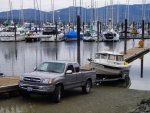I have owned trailerable boats since 1957. The first 4 wheel drive I have owned is the current Yukon XL. The reason I got the 4 x 4, was because it could be towed behind my RV 4 wheels down. I have used the 4 x4 a couple of times;: on a close by sand/gravel ramp--no concrete or tarmac. On the other hands, I have launched on some hard pack sand without 4 x 4 also....but if doing that all of the time, then would have 4 x 4, big tires etc.
I have launched the first 25 with a 30 foot RV (including on the Sequim John Wayne ramp several times). This is a fairly steep and is a tidal ramp, where often there was some algae on the ramp. Perhaps there, and in other circumstances, having weight in the back of the tow vehicle is also a great help.
I launched the Tom Cat and other 25 also with a Ford Excursion with the 7.3 L diesel. That was one of the heaviest SUV's built. I have seen situations where folks with pickups and nothing in the back, needed help getting up a ramp.
A locking differential is also a help. (The Yukon has limited slip/traction control as well as 4x4)
I carry a Viair 40047 400P-RV Automatic Portable Compressor Kit. This is a unit which many of the sand dune and off roaders folks use. I have never had to let the air out of a truck or car towing a boat up a ramp. The compressor is for the trailer and principle vehicle. The "RV" kit comes with long hoses, an air chuck which is the best I have used, along with a very good air gauge.
For the 25, if you are going to be doing much hill towing, then consider a 3/4 ton, diesel is nice--more torque. Also more expensive to run, and to buy. There are plenty of gas trucks which work very well. If I was buying primary as a tow truck for the 25, I probably would get 4 x 4. Certainly limited slip or lock differential. You don't want dual rear wheels--in fact they may be a detriment, unless you are putting a big camper on the truck (Less weight per sq inch on the ramp).
I would advise electric over hydraulic brakes on the 25 trailer in your neck of the woods.

